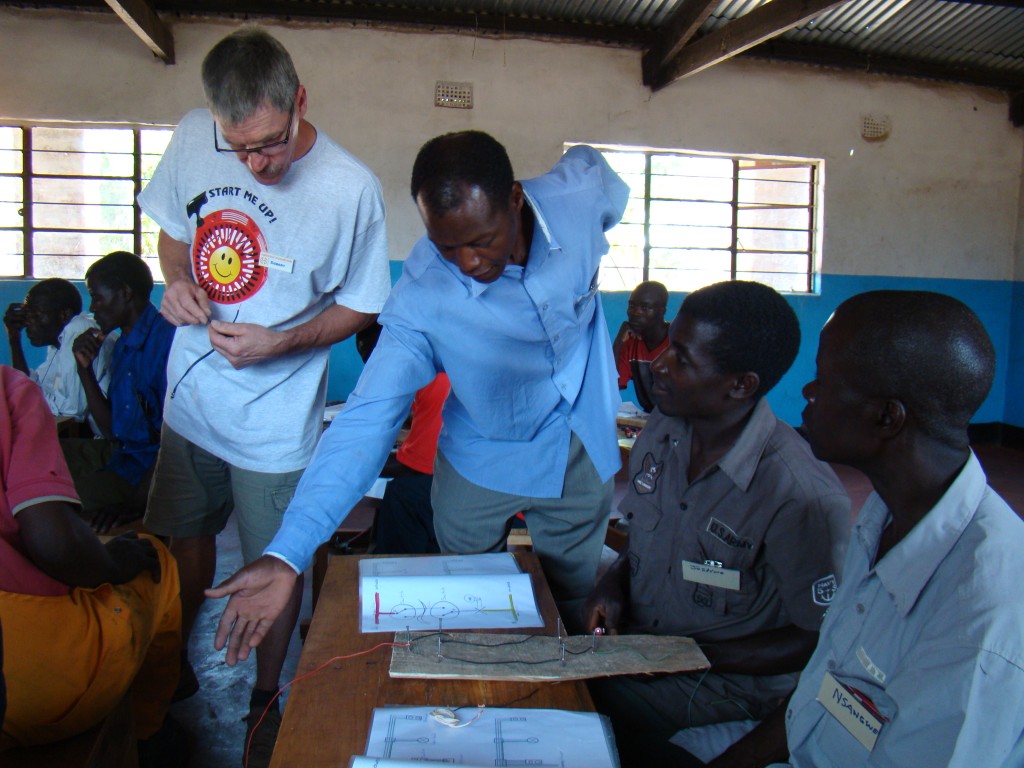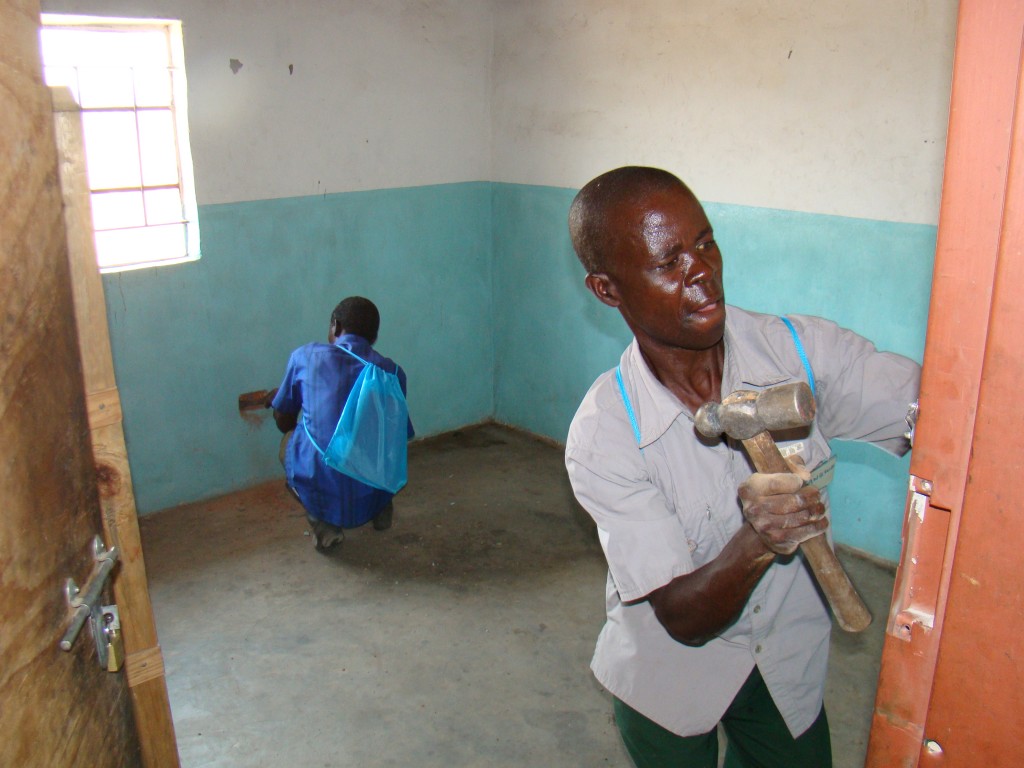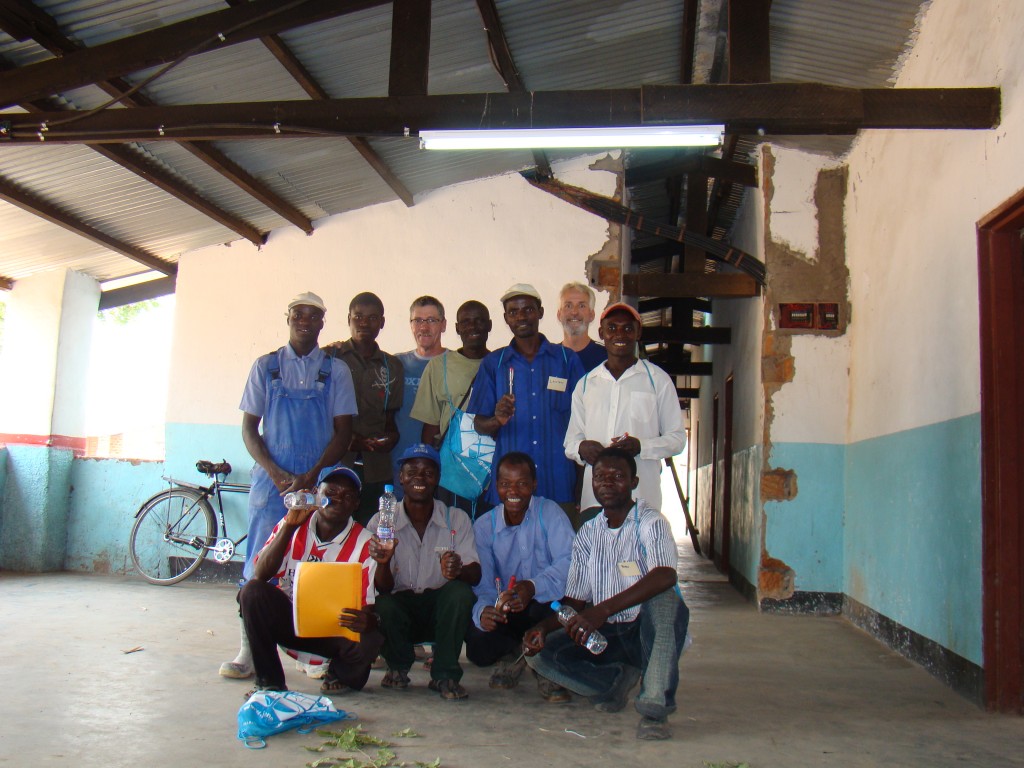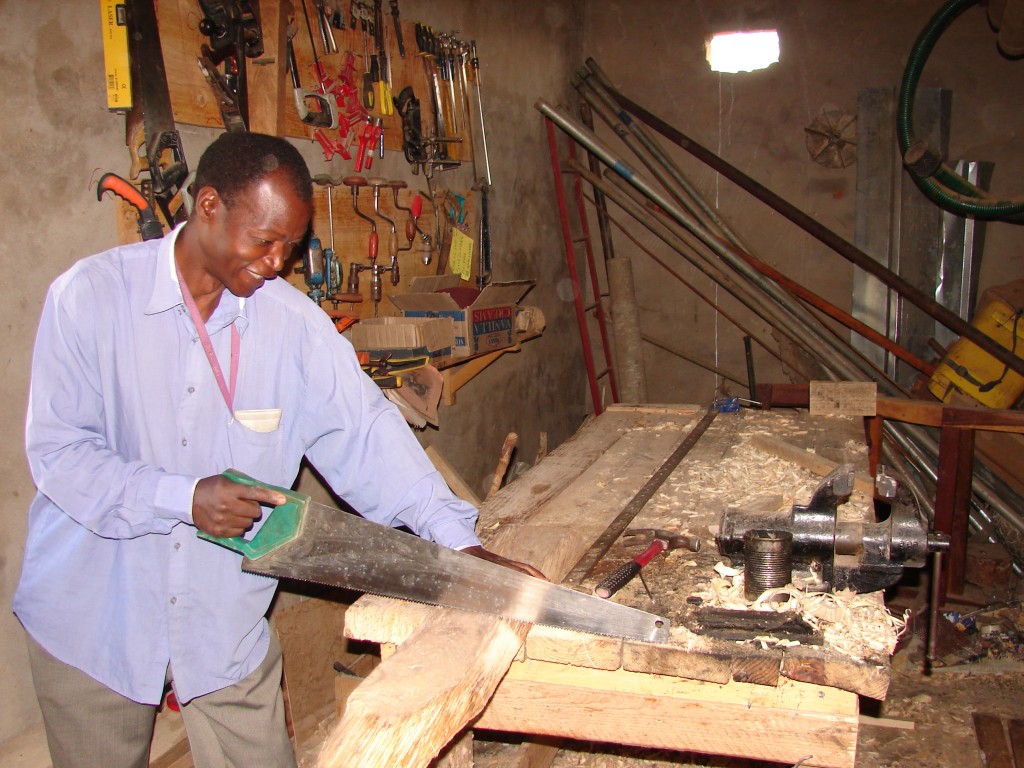In October 2013, we had the opportunity to visit Miloso again for three weeks and to see how everyone was doing. It is heartwarming to meet all the acquaintances again. The village has undergone enormous developments in the last few years. Many people now have a bicycle and the first cars drive around, many houses have been built and small stores have come up for everyday things.
Not everything has changed. We still cook on a charcoal fire and get water from the well about 200 meters from our cottage. Our VIP shower is a barrel of hot water with a cup and our toilet is a hole in the floor. We are able to adapt flawlessly to the African pace, as it is sweltering hot here

We did not come here without a purpose. What is really needed in this village is electricity. Egbert has enough knowledge about the installation of electricity and wants to share his knowledge. Therefore we started by teaching the men of the village about the installation of electricity. The training went very well. The first day in class the local men were already taking a lot of notes and copying diagrams from the blackboard. How did it go again? with the switch and the wires with different colors? It’s wonderful to see how enthusiastic and committed they are to the work.
Electricity is especially needed in the health clinic, and here the chopping in the walls was already finished. A solar panel was placed on the roof, and everything was checked to see if it worked before it was put together. If there was any doubt about how something should be done they consult with each other about how to do it. It is really learning with and from each other around here, wonderful to see! The population is very happy that there will be electricity. Last week three babies were born, one of which during the night. A delivery in the dark night with only one flashlight or under candlelight is a thing of the past. These could soon happen under good lighting. They can hardly believe it.
It is busy in the health post. Many patients come around of whom some are seriously ill with diarrhea, pneumonia, or malaria so they have to stay a day. We test a lot of people for malaria, fortunately it is not so common at this time of year since it is not the rainy season. One particular incident I won’t soon forget, a man came in with a big cut on his heel from an accident. It was cleaned a bit and stitched without anesthesia, five stitches: Brrrrrrr. I was able to assist, and I was nervous. But the man in question gave hardly a peep and after the procedure he was able to walk away with a smile on his face.

After the entire installation of the solar panel on the roof of the health clinic and the wiring, the time had come, the lights were on! The reaction of the people working there was heartwarming, so happy to see the light of a lamp. They said, “We don’t know what to say, we are so happy”. And the smiles on those faces said it all!
During the time we were here, people from the Ministry of Health stopped by for an assessment at the clinic. How surprised they were at the installation of electricity in the building. The local men were proud because their names were written down as expert electricians, a big compliment for their efforts. The hierarchy here is still present, a teacher, the doctor and the pastor are held in high esteem, let alone people from the ministry.
In the hostel electricity was installed in 2011. Due to a strong gust of wind part of the roof had been blown off and therefore part of the electricity no longer worked. Here they repaired everything, a nice learning experience for the men.
On the last day of training, they made plans for electricity in the High School. The students at the High School come from far and wide, not only from Miloso and direct surroundings. This is because this school is known as a very good school where many children come for education. Egbert had made a drawing of the building and asked how they were going to install the electricity. Well, you notice that they know what they have to do and how. They have become good electricians, an asset to the village.

We agreed that in one month, during the vacations, they will start in the school. By continuing to work now, the knowledge they have gained will not sink in. The school is a building with four large classrooms and six offices or storage rooms. They will start with 1 or 2 classrooms and in this way they can step by step provide the school with electricity.
In Europe we sometimes think that Africans are lazy because they hang out under a tree. Well here they show us the opposite. Early in the morning at 5 o’clock they are up to go to work without breakfast. They work until around 1 pm, then they eat Shima. This is a traditional dish, a dough ball of corn flour with some vegetables and if we were lucky fried egg or some meat. Afterwards though, time is taken to unwind, or “hang out under a tree’’. With the temperatures that occur here in the early afternoon, that is the only right thing to do. When the temperature drops at the end of the afternoon they come back into action, until about 6.30 pm because after that it gets dark quickly. Egbert cooked and ate with the men every afternoon after the training. Really a moment of quality time, eating together and ending the day.
The church services were an African experience with much singing and dancing. The church has grown considerably, partly due to the students but also because more families have moved in. It remains special for us to see how faith is intertwined with the daily lives of the people here.

At the training center it is a lively crowd, in January the High School started here so there are many students walking around. Some come from far and sleep in the hostel. Now that we have been here for a longer period of time, people are becoming more open and come to talk to us. Both locals and students come to ask why we are here in Miloso and where we are from. Everyone greets you and many people want to have a chat to hear what you do here.
In the evenings we can enjoy a beautiful starry sky with the Milky Way clearly visible as there is no false light in dark Africa.
It is heartwarming to see the developments that this village is going through here in the countryside, and the commitment of the people to improve their living environment. Like the electricians, but also a local farmer we visited. He learned how to cultivate his land better in order to get a higher yield from it. With the possibilities and resources that they have within reach and as most important goal to supporting his family as best as possible and sending his children to school. That is the definition of the Zambian way.
And so our stay in Miloso came to an end, saying goodbye hurts, but we will definitely be back. And to see how well the locals are doing together makes us very happy!
Kind regards,
Egbert and Dinie

